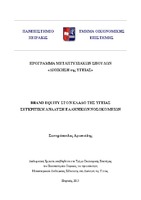Brand equity στον κλάδο της υγείας συγκριτική ανάλυση ελληνικών νοσοκομείων
Brand equity in health sector comparative analysis of Greek hospitals

Προβολή/
Λέξεις κλειδιά
Επώνυμο προϊόν ; Φήμη προϊόντος ; Κλάδος υγείας ; Μέτρηση φήμης προϊόντος ; Brand ; Brand name ; Health sector ; Brand equity ; Rand equity measurementΠερίληψη
Η μέτρηση της φήμης ενός προϊόντος ή μιας υπηρεσίας (brand equity) είναι
περίπλοκη αλλά και σημαντική διαδικασία για μια εταιρία επειδή της παρέχει
πλεονέκτημα έναντι των ανταγωνιστών της και της δίνει τη δυνατότητα να εδραιώσει
τη θέση της στην αγορά. Σε αυτή την διπλωματική εργασία , η έννοια του brand equity
προσεγγίστηκε και αναλύθηκε με όρους marketing και όχι με χρηματοοικονομικούς
όρους. Το γεγονός στο οποίο δόθηκε μεγαλύτερη βάση είναι το πώς οι εταιρίες θα
ισχυροποιήσουν τους συσχετισμούς του brand στο μυαλό των καταναλωτών ,
αυξάνοντας έτσι την αναγνωρισιμότητά του.
Στο πρώτο κεφάλαιο γίνεται μια αναδρομή στη ιστορία σχετικά με τα πρώτα
brands και παρουσιάζεται η εξέλιξή τους από τότε έως και σήμερα. Στο δεύτερο
κεφάλαιο δίνεται ο ορισμός και ερμηνεύεται η λέξη «brand» (επώνυμο προϊόν) .Επίσης,
αναλύονται τα διάφορα στοιχεία που αποτελούν ένα brand και παρουσιάζεται η
σημαντικότητά τους τόσο για τους καταναλωτές, όσο και για τις επιχειρήσεις ,
δεδομένου ότι αποτελούν πηγή αξίας και για τους δύο. Στο τρίτο κεφάλαιο , δίνονται
αρχικά διάφοροι ορισμοί του brand equity έτσι ώστε να γίνει κατανοητή η έννοιά του.
Στη συνέχεια , παρατηρούμε ότι ακόμα δεν υπάρχει κάποιος κοινά αποδεκτός όρος τους
brand equity , ούτε τρόπος μέτρησής του. Συνεπώς , παρουσιάζονται και αναλύονται οι
δύο πιο βασικές και εμπεριστατωμένες προσεγγίσεις του brand equity , αυτές των
Aaker και Keller, στις οποίες βασίζεται και το μεγαλύτερο ποσοστό των ακαδημαϊκών
ερευνών.
Στο τέταρτο κεφάλαιο παρουσιάζονται οι μέθοδοι μέτρησης του brand equity
κατά Aaker και κατά Keller που όπως ήδη αναφέρθηκε , αποτελούν τις σημαντικότερες
από τη σχετική βιβλιογραφία. Στο πέμπτο κεφάλαιο γίνεται η εισαγωγή στον κλάδο
υγείας . Σε αυτό το κεφάλαιο αναλύονται τα χαρακτηριστικά και οι ιδιαιτερότητες του
κλάδου υγείας. Επίσης , ορίζονται τα συστήματα υγείας και παρουσιάζονται οι μορφές ,
οι πηγές χρηματοδότησης και τα προβλήματα που υπάρχουν στα συστήματα υγείας.
Στο έκτο κεφάλαιο παρουσιάζεται το πώς επιδρά το brand equity στον νοσοκομειακό
κλάδο , γίνεται αναφορά στη σημαντικότητα που έχει το branding για τα νοσοκομεία
και αναλύονται οι παράγοντες επιτυχούς brand equity στο νοσοκομειακό κλάδο ,
δηλαδή οι παράγοντες που έχουν την μεγαλύτερη βαρύτητα στη διαμόρφωση του brand
equity . Στο έβδομο κεφάλαιο γίνεται παρουσίαση μιας συγκριτικής ανάλυσης μελετών
ικανοποίησης ασθενών μεταξύ δύο δημόσιων νοσοκομείων , από τα οποία το ένα είναι
νεοσύστατο και το άλλο έχει αναπτύξει τη φήμη του για την παροχή συγκεκριμένου
είδους υπηρεσιών υγείας. Η ικανοποίηση των καταναλωτών αποτελεί σημαντικό
παράγοντα διαμόρφωσης του brand equity κατά τον Keller και η σύγκριση ενός
νεοσύστατου νοσοκομείου, χωρίς φήμη, με ένα άλλο που ήδη έχει κάποια φήμη στην
αγορά , αποτελεί τρόπο εκτίμησης και εξαγωγής συμπερασμάτων σχετικά με το brand
equity των νοσοκομείων.
Το όγδοο κεφάλαιο εστιάζει στον ιδιωτικό τομέα παροχής υπηρεσιών υγείας και
πιο συγκεκριμένα σε τρεις από τις μεγαλύτερες εταιρίες παροχής υπηρεσιών υγείας
στην Ελλάδα , τον όμιλο «ΥΓΕΙΑ» , τον όμιλο Ιατρικού Αθηνών και τον όμιλο
«ΙΑΣΩ». Αρχικά, στο κεφάλαιο αυτό γίνεται παρουσίαση της δομής του κάθε ομίλου
σχετικά με το ανθρώπινο δυναμικό , τις παρεχόμενες υπηρεσίες υγείας , του διαθέσιμου
εξοπλισμού , των επενδυτικών κινήσεων και των ενεργειών προώθησης και προβολής.
Επιπροσθέτως , γίνεται παρουσίαση των οικονομικών στοιχείων των ομίλων της
τριετίας 2002-2004, της περιόδου των πρώτων χρόνων της οικονομικής κρίσης στην
Ελλάδα (2008-2010) και της διετίας 2013-2014 με σκοπό της εξαγωγή συμπερασμάτων
για την αποτελεσματικότητα και την επίδραση των προωθητικών ενεργειών, με στόχο
την αύξηση του brand equity, στα οικονομικά μεγέθη των εταιριών. Τέλος , στο ένατο
κεφάλαιο γίνονται προτάσεις για πιθανές μελλοντικές έρευνες και προτάσεις προς τους
managers και marketers.


